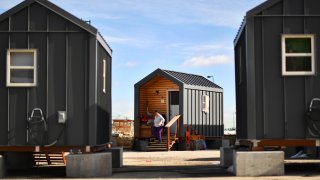
- When it comes to tiny home affordability, North Dakota, New Hampshire and New Jersey rank at the top.
- Nationally, the average cost of a tiny home is $52,000, 87% cheaper than the average price of a typical home.
- Buyers, however, are paying more per square foot on tiny homes, 62% more.
Demand for tiny homes, either stand-alone or backyard dwellings, rose significantly during the coronavirus pandemic, as some homeowners looked for additional space and others looked for more affordable space. Along with the rest of the housing market, however, the costs are rising.
Tiny homes are generally designated as being under 600 square feet, but the average size of a tiny house for sale in the U.S. is actually just 225 square feet, or roughly eight times smaller than a typical home, according to a new survey by Porch.com, a home services platform.
Nationally, the average cost of a tiny home is $52,000, 87% cheaper than the average price of a typical home. Buyers, however, are paying more per square foot on tiny homes, 62% more.
We're making it easier for you to find stories that matter with our new newsletter — The 4Front. Sign up here and get news that is important for you to your inbox.
"There is a lot of detail and complexity in connecting and integrating all the mains (electricity, sewage, heating) in a relatively small building," said Volodymyr Kupriyanov, a researcher at Porch.com. "All of the material and labor often require custom or specialty sizing, which all adds to additional cost of building and maintaining the tiny home."
Also, local zoning laws for tiny homes can vary drastically state to state and even county to county, adding costs for some homeowners. In addition, utility hookups can be an expensive part of a tiny house.
"If your house is located off-grid – meaning there's no access to utility sources – you may need to collect rainwater or dig a well, use solar panels and install a septic system. All of these will add to the cost of a tiny home build," added Kupriyanov.
Money Report
So where do you get the biggest bang for your buck on a tiny home? They're cheapest in North Dakota ($28,000) overall, but if you're going by square foot, homes in Arkansas are cheapest. Hawaii, which is one of the most expensive housing markets in the U.S., also has the most expensive tiny real estate, with an average price tag over $149,000 or $490 per square foot.
When it comes to tiny home affordability, North Dakota, New Hampshire and New Jersey rank at the top. Tiny homes there cost less than half the average annual household income. Tiny homes are least affordable in Hawaii, Montana and New Mexico.
Potential buyers of tiny homes also need to consider the cost of insuring their tiny investments. And that differs by region as well.
The most expensive state to insure a tiny home is in Oklahoma, followed by Tennessee, Kansas, Texas and Colorado, according to ValuePenguin, an insurance research website from LendingTree. That is likely because those states have high rates of tornado activity. In Oklahoma, the cost of tiny home insurance is 242% times greater than the national average, but it's still less than insuring a regular-sized home in the state.
ValuePenguin also looked at sale-related search terms on Google and found that Alabama, Arkansas, Idaho, Oregon and Wyoming have the most people looking to buy tiny houses. Insurance in Alabama and Arkansas is among the most expensive in the country for tiny homes, though. The company suggests owners of tiny homes try to bundle their home insurance with their car insurance to save money.
As with all homebuilders now, the cost to construct a tiny home is also rising. That is due to supply chain issues and rising costs for land, labor and materials.
"The median cost of a tiny house today is about $60,000, and the price keeps climbing as the demand for these smaller structures increases and builders push the boundaries of what they can look like," said Kupriyanov, who also noted that tiny houses are not guaranteed to appreciate in value the way a regular home will.
"In fact, tiny homes may actually depreciate in value, especially if it is customized to your wants and needs. Tiny homes also fall into a very niche market, so it may be harder to sell your home," he said.






